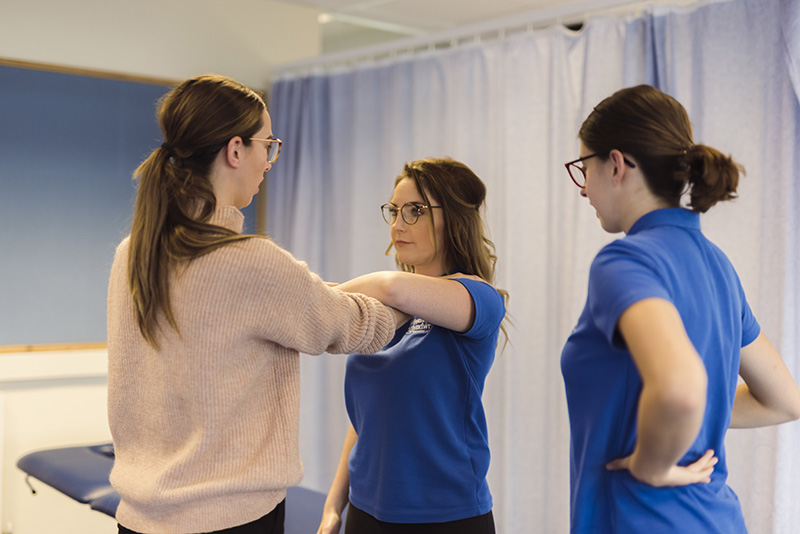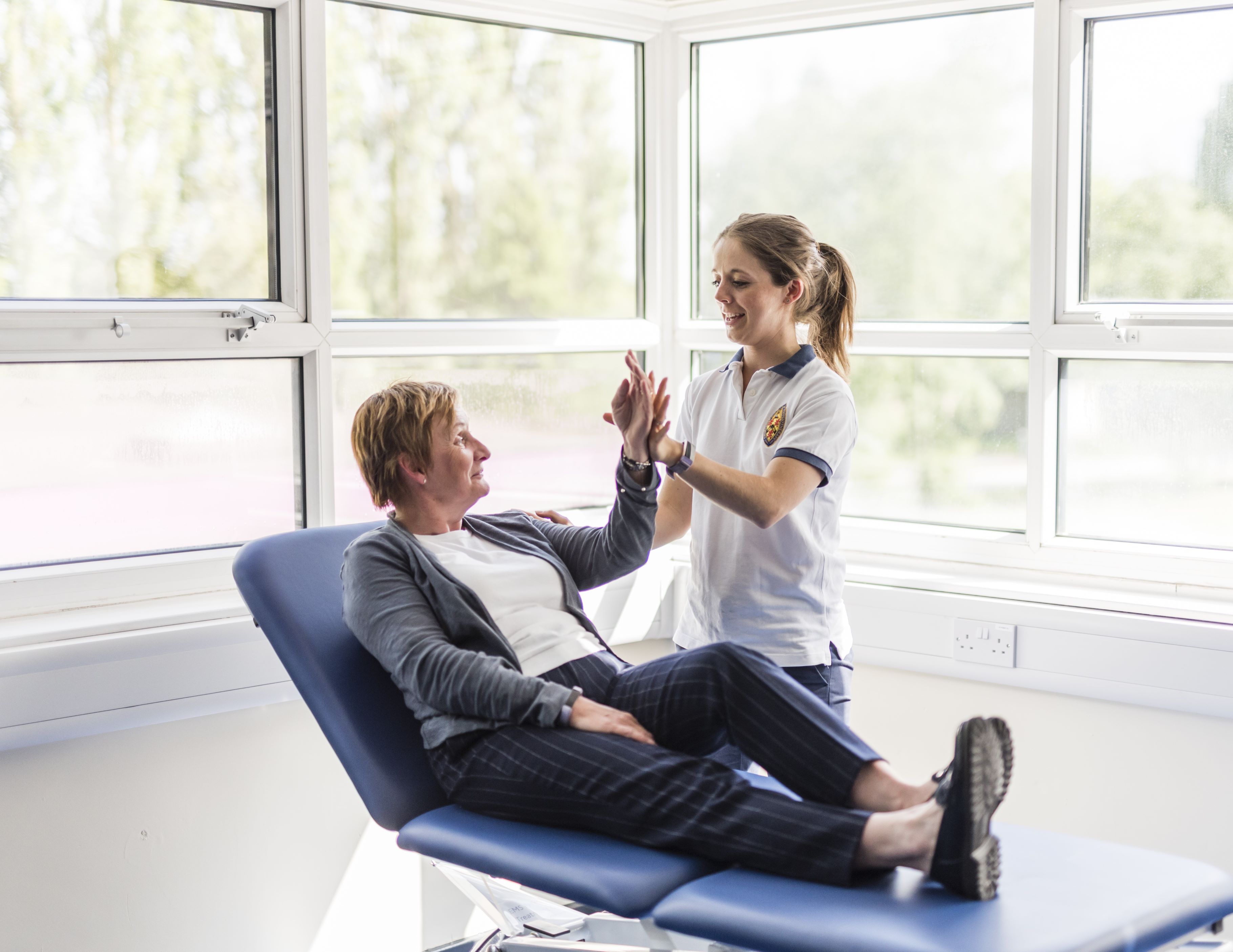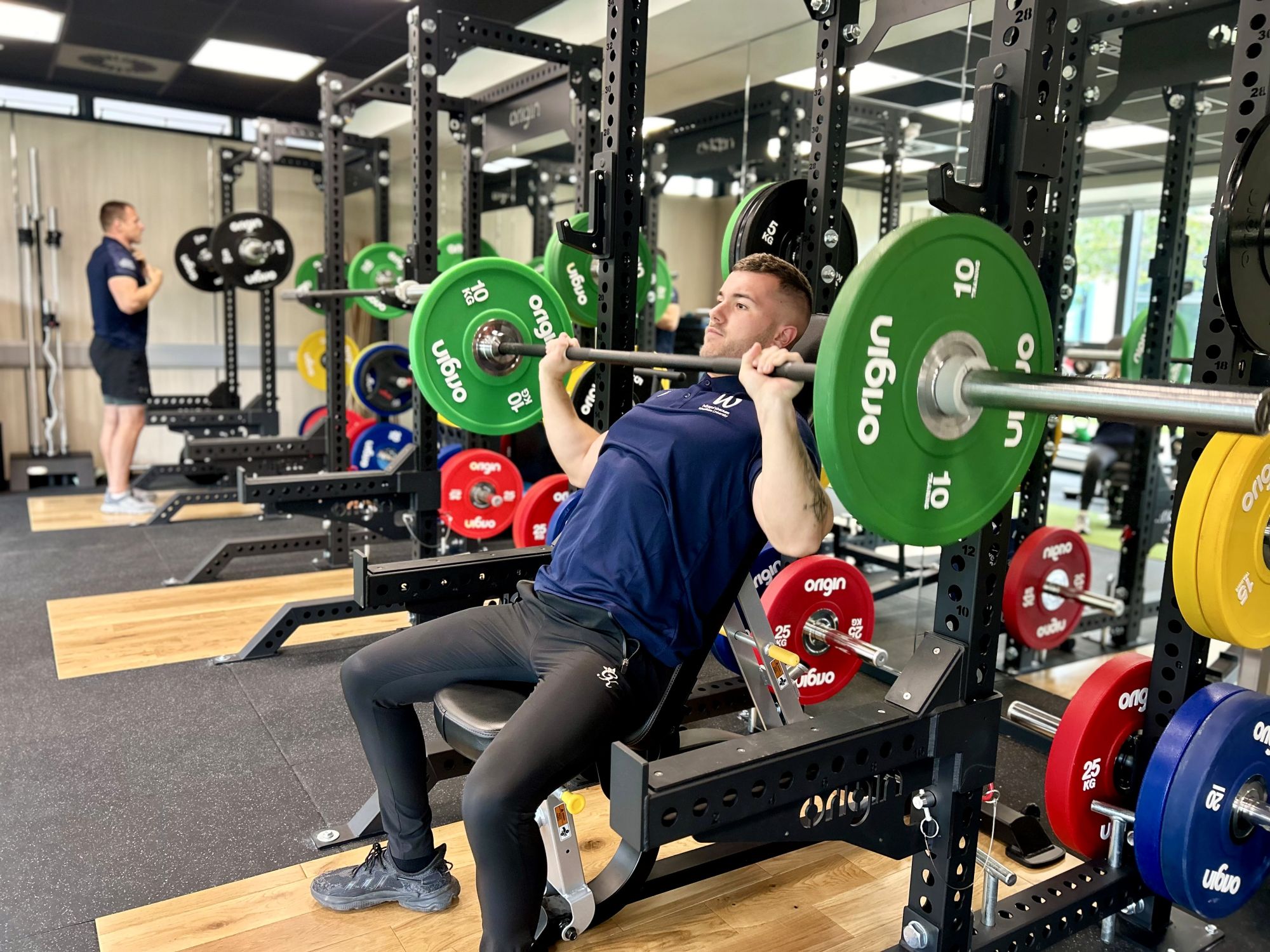.jpg)
Course details
UCAS Code
SIFY
Year of entry
2026
Duration
4 YRS (FT)
UCAS Tariff
48-72
Institution Code
G53
Location
Wrexham
Course Highlights
Accredited
by the British Association of Sport Rehabilitators (BASRaT)
Study
in our CASES-accredited Physiology Laboratory
Benefit
from the knowledge and expertise of industry professionals
Why choose this course?
This course will prepare you to excel in the dynamic field of integrated sports, injury rehabilitation, and the management of health conditions, as well as in specialised environments such as professional sports teams and health promotion initiatives.
You will:
- Pursue a course that’s accredited by the British Association of Sport Rehabilitators (BASRaT)
- Have numerous opportunities to engage in real-world, work-based learning in elite sporting environments through collaborations with our industry partners, including the Football Association of Wales, The New Saints FC, and The Rehab Physio
- Study in our CASES-accredited Physiology Laboratory and state-of-the-art Biomechanics Laboratory, equipped with the latest technology
- Benefit from the knowledge and expertise of industry professionals
- Develop skills in workload management and professionalism to enhance client care
- Be able to practice safely, competently and confidently to ensure you meet the exacting standards of becoming a Graduate Sports Rehabilitator (BASRaT)
Our academic team is here to inspire and empower learners through a commitment to excellence in sport and exercise sciences. We strive to create a dynamic environment that fosters innovative research and applied practice, forging strong partnerships with local and global communities. By integrating enterprise and consultancy into our courses, we aim to enhance the quality of education and promote sustainable practices in sport, coaching, health and fitness. Together, we will cultivate a culture of curiosity and collaboration, preparing you to lead and make impactful contributions to the field and beyond.


.png)

Sports Injury Rehabilitationat Wrexham University
Interested in Sports Injury Rehabilitation? Hear from lecturers and students to learn more about this degree.
Key course features
- Develop a clinical approach to therapeutic methods for treating neuromusculoskeletal injuries.
- Comprehensive focus on health, injury and rehabilitation, covering injury prevention through to recovery.
- Learn and practice skills in a safe, supportive environment through our onsite clinic.
- Examine the physiological, psychological, cultural and social factors influencing individual health and wellbeing.
- Learn about the importance of motivational interviewing and effective communication
- Become adaptable and responsive to the changing climate of sports rehabilitation.
- Demonstrate and apply wider understanding/theoretical principles affecting sports rehabilitation.
What you will study
YEAR 1 (FOUNDATION YEAR)
The Foundation Year is an integrated year where you will study core modules with a broad range of students from across the Faculty of Social and Life Sciences, giving you access to different perspectives and networking opportunities.
The modules will equip you with key skills needed for Higher Education and beyond. They will give you the chance to explore your subject area and available careers, allowing you to adapt your reading and assessments to be relevant to your degree pathway.
Alongside teaching from the broader faculty staff, you will be able to meet with staff and other students from your main degree pathway and get involved with events and opportunities that they are running.
- Study Skills for Success (Core): This module will provide a solid foundation in academic conventions and time management skills to help you to progress through your degree.
- Resilience in Higher Education and Beyond (Core): Personal development and resilience are as important as academic skills in the accomplishment on your journey towards graduation, and this exciting module will equip you with the attributes needed for this.
- A Day in the Life (Core): This module allows you to explore the potential career options open to you on completion of your chosen degree. You will be exploring the professions linked to your degree and start preparing your graduate portfolio for employers.
- Life and Work in the Welsh Context (Core): This module will give you the opportunity to explore your subject area and/or desired career in relation to living and working in today’s Wales.
- Welsh for First Time Learners (Optional): This module provides an introduction to the Welsh language for those taking their first steps.
- Numeracy (option): If your degree requires a competent level of numeracy, you may be advised to choose this option.
- Professional Communication in the Workplace (Optional): In this module, you will begin to develop the skills and aptitude necessary to communicate effectively in a professional context.
- Maths and Experimental Design (Optional): If your degree pathway requires an understanding of numeracy and sciences, then this module is designed to provide the opportunity to achieve that.
YEAR 2 (LEVEL 4)
At Level 4, the modules are designed to provide a strong foundation in the principles and practices essential for sports injury, health, and fitness. These modules focus on developing core skills, theoretical understanding and practical techniques.
MODULES
- Introduction to research skills: In this module, you will enhance transferable skills to explore research methods and gain experience with software supporting qualitative and quantitative research.
- Professional practice: In this module, you will explore professional conduct, collaboration, person-centred care, and reflective practice for continuous development.
- Anatomy, physiology and human movement: This module introduces anatomy, physiology, human movement, exercise responses, and lab-based data analysis.
- Neuromusculoskeletal assessment: This module introduces assessment and management of neuromusculoskeletal injuries.
- Applied massage and soft tissue treatment: This module covers massage techniques, their application to normal tissue and their effects on performance pre, inter and post-event.
- Physical activity for health: This module explores public health policies, social determinants of health, the benefits of physical activity within a biopsychosocial model and first aid skills for sports rehabilitators
- Level 4 Placement: Minimum of 50 hours (observational).
YEAR 3 (LEVEL 5)
At Level 5, the focus shifts towards building competency in practical skills and applying theoretical knowledge to professional practice. These modules aim to develop your ability to manage and rehabilitate injuries effectively while strengthening research and professional skills.
MODULES
- Academic discovery - building strong research ideas: This module develops your understanding of research design, ethics and methods, whilst building analytical and evaluative skills for independent research and future careers.
- Applying principles of sport psychology: This module introduces major theories in sport and exercise psychology, measurement methods and applying theory to practice.
- Applied professional practice: This module focuses on professional conduct, collaborative strategies, person-centred care with effective communication and personal analysis through continuous development and reflective practice.
- Peripheral injury management: This module develops knowledge of selecting and safely applying treatment modalities and injury management for musculoskeletal conditions within the scope of a Graduate Sports Rehabilitator.
- Rehabilitation and conditioning: This module focuses on conducting comprehensive needs analyses and prescribing safe and effective exercises for injury treatment.
- Neurological injury, assessment and management: This module focuses on assessing the spine and neurological system then selecting the appropriate management.
- Level 5 Placement: Minimum of 110 hours.
YEAR 4 (LEVEL 6)
At Level 6, the focus is on preparing you to become an autonomous Graduate Sports Rehabilitator. These modules are designed to consolidate knowledge, refine clinical skills, and develop the independence required for professional practice.
MODULES
- Independent discovery: This module will develop your research skills, enabling you to identify issues, apply methods and complete a dissertation on a chosen research topic.
- Professional practice and employability: This module prepares you for employability as a Graduate Sports Rehabilitator.
- Clinical reasoning and complex patient management: This module develops skills in the management of complex patient presentations, data-driven decision-making, and clinical reasoning skills required for Graduate Sports Rehabilitators.
- Level 6 Placement: Minimum of 240 hours.
The information listed in this section is an overview of the academic content of the programme that will take the form of either core or option modules. Modules are designated as core or option in accordance with professional body requirements and internal academic framework review, so may be subject to change.
Entry requirements & applying
For entry onto our foundation year programme, we require the following:
- At least 48-72 UCAS points at A2 level or equivalent.
- A background in science, maths or sport are an advantage, but not essential. If students have been out of education for > 5 years or do not have a science, maths or sport background, they must submit a personal statement to the programme team, even if they have the required UCAS points.
Applicants may enter the programme at various levels with Recognition of Prior Learning (RPL) or Recognition of Prior Experiential learning (RPEL) in accordance with the University General Regulations.
Occupational Health Clearance
All applicants successful in being offered a place on the programme will be subject to a satisfactory occupational health clearance, due to the nature of clinical work and potential placements in the NHS or another healthcare setting. This also includes a requirement for relevant immunisations prior to securing a place. This is carried out between an occupational health provider through a service level agreement between the University and provider.
It may be beneficial, and it is recommended, that students hold a full UK driving licence and have the use of a car, as this will maximise practice placement opportunities throughout the duration of the course.
Before you are offered an unconditional place on this degree, you will be required to complete a Disclosure and Barring Service (DBS) clearance (previously known as CRB), so that a check can be made on your suitability for working with children and vulnerable adults.
Teaching & Assessment
How you'll be taught
- The programme incorporates the Wrexham University Active Learning Framework (ALF), combining digital resources, formative assessments, personalised feedback, and modern physical facilities to deliver an inclusive and supportive learning experience.
- Work-based placements across all levels provide professional development and networking opportunities through partnerships, external events and symposiums with ongoing feedback to enhance placement experiences.
- Students participate in external events (e.g., charity runs, sports competitions) and an onsite clinic to gain practical experience whereby we support the local community and ensure high-quality, supervised learning.
How you'll be assessed
- Assessments include practical examinations, critical reflections, presentations, laboratory reports and case studies, aligning with BASRaT recommendations and developing key graduate skills.
- Assessments are designed to meet learning outcomes, combining practical and academic strategies to develop critical thinking, clinical reasoning, and practical skills progressively through the programme.
- Assessment submission dates are strategically planned to balance workload and placement opportunities.
- Regular formative assessments, such as quizzes, mock exams and peer-supported activities encourage continuous development with personalised feedback and support from programme staff to address challenges and monitor progress.
Teaching and Learning
We offer workshops and support sessions in areas such as academic writing, effective note-making and preparing for assignments.
Students can book appointments with academic skills tutors dedicated to helping deal with the practicalities of university work. Our student support section has more information on the help available.
In terms of particular needs, the University’s Inclusion Services can provide appropriate guidance and support should any students require reasonable adjustments to be made because of a recognised prevailing disability, medical condition, or specific learning difference.
Career prospects
Our dedicated Careers and Employability team is committed to helping you achieve your professional goals. They provide personalised advice, useful resources, and extracurricular employability events to prepare you for the job market.
Graduates of this course can pursue careers in:
- Professional Sports Clubs
- Self-employment in the private sector
- Partnership in a clinic or practice that offers Physiotherapy, Sports Rehab/Sport Therapy services
- Working as a healthcare or wellbeing practitioner
- Exercise rehabilitation roles in the Armed Forces
- Teaching
Additionally, you may choose to further your expertise through postgraduate studies. Explore our postgraduate courses for more information.
Fees & funding
You do not have to pay your tuition fees upfront.
The fees you pay and the support available will depend on a number of different factors. Full information can be found on our fees & finance pages. You will also find information about what your fees include in the fee FAQs.
All fees are subject to any changes in government policy, view our undergraduate fees.
Accommodation
At Wrexham University, we offer on-campus en-suite rooms within our Wrexham Student Village. These private, fully furnished spaces are conveniently located, providing easy access to campus facilities, study areas, and social spaces. Plus, you’re just a 10-minute walk from the city centre!
With all bills included, free Wi-Fi, 24/7 security, and large social areas, you’ll find everything you need for a great student experience.
Explore our student accommodation options to find your perfect home away from home.
Upcoming Open Days.
Join us at an upcoming open day to meet your lecturers, find out more about our courses, discover our facilities and get a taste of student life.
Browse all of our open days & events.

